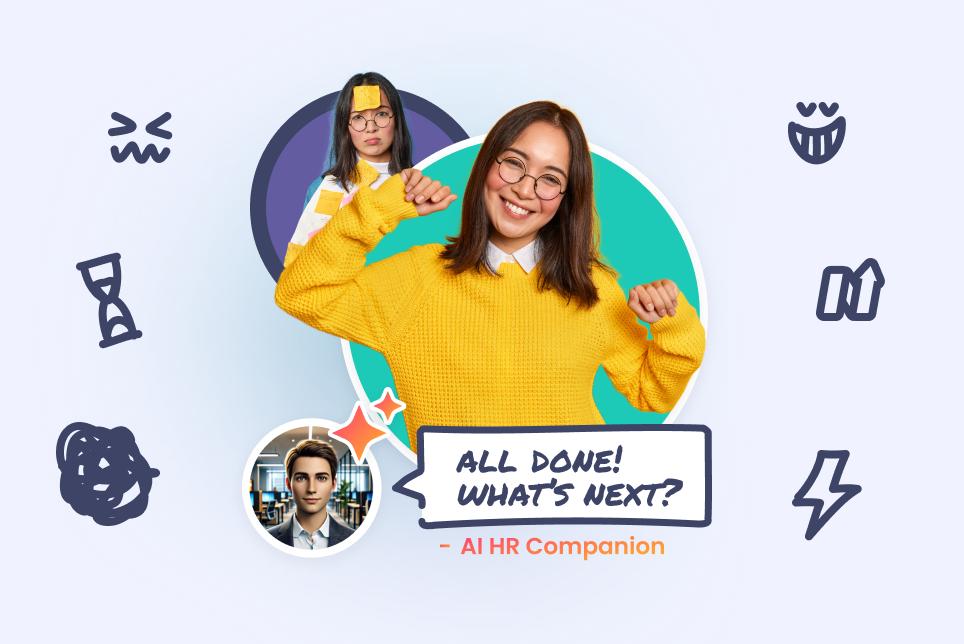
New performance management systems are, above all, people-centric. They are more analytical and data-driven, focusing on how employees can improve their output and develop themselves rather than solely tracking metrics and progress toward objectives. And this is an excellent approach to improve business performance.
To succeed with its implementation, organizations should focus on developing their people’s skills and proficiency levels, as a way to encompass the new needs of employees, strengths and increased mobility, and the new dynamic nature of work.
Today’s jobs have changed and companies need to incorporate new technologies and ways of working into everyday flows to stay competitive. But to do this, people need to adapt, stay flexible, and learn how to use new tools or how to deal with unknown challenges. And they can’t do it without developing new capabilities and skills.
In parallel, a mindset shift has also emerged together with the rise of a multi-generational workforce that:
- is eager for continuous self-development and growth opportunities
- looks for more flexible conditions of work
- wants to have a choice over the work they do
With this being said, let’s try and understand how focusing on skills can help you unleash the full potential of your employees and improve business performance.
1. Skills can align performance, development, and learning
Organizations that realign HR processes to match skill needs can boost employee engagement by 50%, lower training and development program costs by 50%, and raise productivity by 40%.
— McKinsey & Company
At its core, organizational learning should respond to each employee’s need for development as a way to further improve both personal and business performance. Yet, for many companies, there has been an increasing disconnect between development needs, learning, and performance.
On one hand, managers together with their teams are focused on their objectives and regularly track the progress and their achievements during the performance cycle. On the other hand, learning programs are initiated with no alignment to the specific individual or organizational goals mentioned above, and they are only measured against how many people can complete the learning objectives and how fast.
Companies need to rethink the learning experience to ensure it responds to the growth needs of each employee and ultimately drives better outcomes at the individual and organizational levels. And skills are the common element that links these processes.
How Nestor can help improve your business performance with the power of skills
A platform like Nestor collects data about the performance of each employee but also about the manager/employee interactions, individual career aspirations, and the acquired and desired skill sets, linked to the job role and expectations.
In Nestor, each employee gets a unified skills-based profile that links abilities and proficiency levels to the most important talent operations such as:
- goals
- feedback
- competencies
- behaviors
Following the feedback sessions, the 1:1 meetings, or the performance reviews during a performance management cycle, employees — together with their managers — can have clear outcomes not only about the future actions aimed to help them perform better but also consider opportunities for development and learning.
This way talent development objectives (like new career paths or advancement inside the company) can be tied with clear learning objectives (acquiring a new proficiency level for a type of skill through a mentorship program) and finally assess their impact on business objectives during the performance reviews.
So, don’t forget to include learning and development objectives in your quarterly performance reviews, track development against these goals, and encourage people to apply their newly acquired skills during everyday work.
Skills are not only linked to learning programs but also to performance. The more people’s skills are up-to-date, the more productive people will be with direct results in business outcomes.
2. Career growth opportunities can directly impact company success
Career growth opportunities can take various shapes and might be related to advancing in the current role, taking a new job, or making a lateral move inside your organization. Whatever it may be, career growth has become a must, especially for younger generations of workers.
When you offer employees opportunities for career growth that match their desires and interests, you give them the chance to apply their skills and strengths in the direction that will yield the best outcomes.
Moreover, a very comprehensive Gallup study rollout on 1.2 million employees globally shows that strengths-based employee development practices lead to:
- increased sales and profit
- higher customer engagement
- lower turnover rates
3. Skills development helps you stay competitive
Keeping up with the rapidly changing needs associated with the accelerated adoption of new technologies and the new dynamic nature of work is no longer a matter of choice.
Companies cannot afford to maintain employees with obsolete skills, especially since a potential mismatch between skills and the expectations of a job role can influence an employee’s achievements and the company’s overall productivity.
For example, if an employee lacks the knowledge and the capabilities to properly use the company’s resources like new tools or systems, they will lack confidence and need additional time to perform their tasks. The July 2021 Monster Job Index reinforces our perspective:
54% of employees fear they don’t have the skills they need to thrive in a workforce that emphasizes collaboration using technology
— Monster Job Index
Therefore, assisting your employees with the right learning opportunities that match their needs and help them to continuously develop means high-quality work in less time and effective contribution to the organizational goals.
4. Employees with excellent soft skills perform better
Soft or people skills can unleash a transformative value in the modern workplace and an increasing number of organizations start to understand and appreciate their critical role. They have begun to invest in the training and development of their workforce to build the critical soft skills and behaviors that can positively influence workplace culture and can lead to higher performance.
Although it is difficult to assess the influence of soft skills on employees’ performance, some studies point out an increased work performance by up to 15% following employees’ acquisition of soft skills.
People skills have such a powerful role because they give employees the ability to adapt and also to perform amid changing circumstances. The employees who focus on building these skills will be more relationship-oriented and initiative driven. By contrast, developing only hard skills makes employees task-oriented, which is not enough in today’s hybrid work environment.
5. Agile cross-functional teams are more innovative
In the modern world of work, organizations rely on continuous innovation and technology to stay ahead of their competitors. And this is why agile ways of working, including cross-functional collaboration, are gaining ground. Insights from a McKinsey survey also confirms that agility pays off:
81% of respondents in agile units report a moderate or significant increase in overall performance since their transformations began. And on average, respondents in agile units are 1.5x more likely than others to report financial outperformance relative to peers, and 1.7x more likely to report outperforming their peers on nonfinancial measures.
— McKinsey & Company
To break down department silos and push employees to work across boundaries, organizations are shifting away from the traditional job architecture to a dynamic skills-based approach. This means effectively redesigning the organizational structure with a focus on skills to drive better collaboration across teams and more effective resource allocation.
The new skills-based approach allows organizations to drive workforce agility by using skills to redeploy talent fast, plan for effective workforce management and match the best-fit candidates with the right activity inside an organization, whether it’s a project, role, or team. This is what we call today skills-based organizations.
Final thoughts
Employee performance cannot be seen as a standalone process focused solely on objectives and metrics. Instead, the focus should also include actions aimed at current and future employee development. And skills are the common language, the answer that can bridge the gaps between all talent operations.
Linked with goals, feedback, and behaviors, skills can spotlight areas for improvement so that employees can access the best-fit learning and development opportunities to improve those skills and knowledge that can enhance their productivity and the overall business performance.










